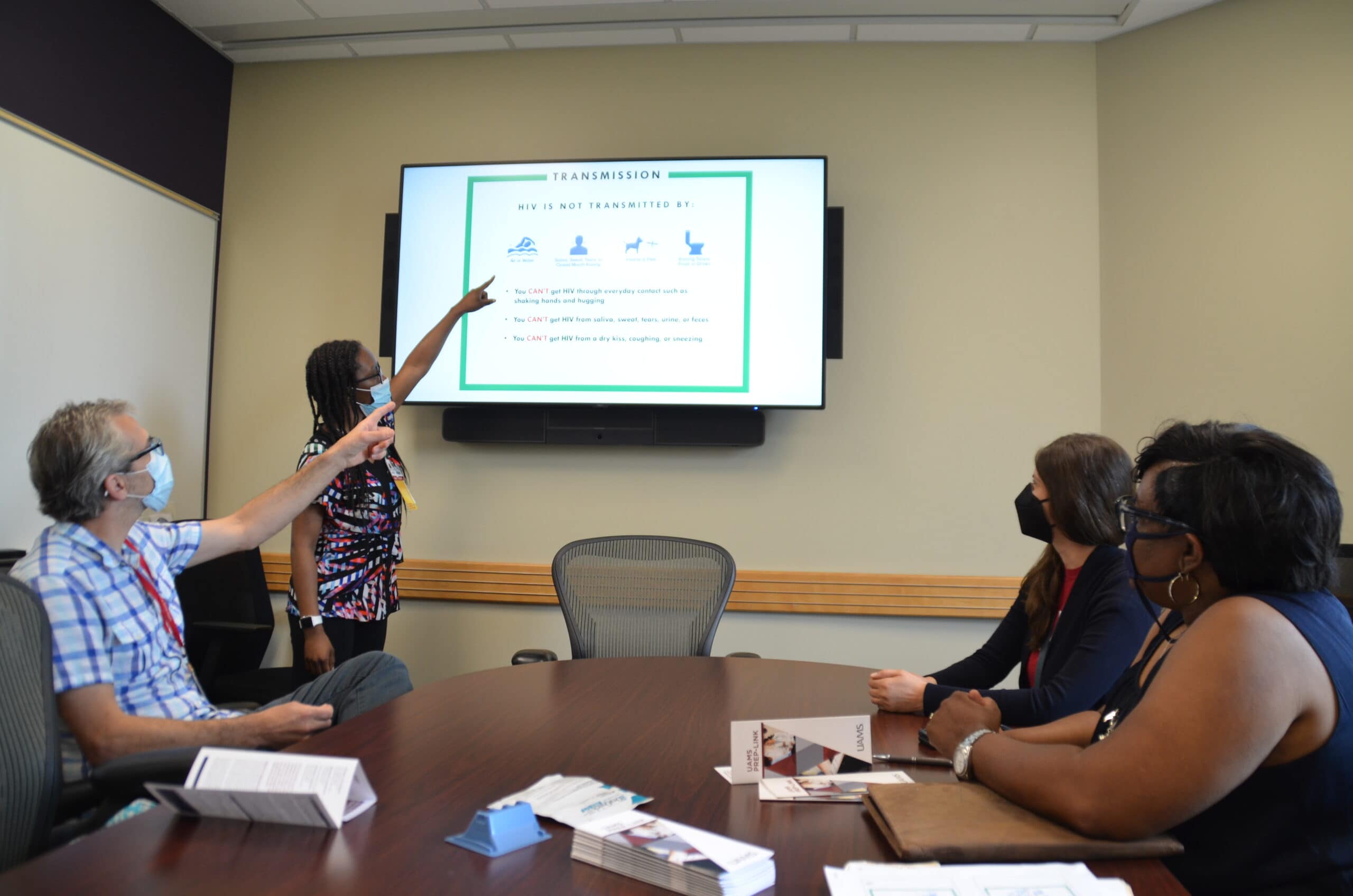Zaller Works with Pulaski County Correctional Facilities to Promote HIV Awareness
| A team from the University of Arkansas for Medical Sciences’ Fay W. Boozman College of Public Health is teaching individuals in correctional facilities about human immunodeficiency virus (HIV).
Led by Nick Zaller, Ph.D., a professor in the Department of Health Behavior and Health Education, this HIV awareness initiative is a research project of the college’s Southern Public Health and Criminal Justice Center. This study is funded by National Institute on Minority Health and Health Disparities through the UAMS Arkansas Center for Health Disparities.
Launched in 2018, the pilot program is in five reentry facilities in Pulaski County. The classes take place twice a month and are typically limited to 20 clients per session. If individuals who take the class are interested in participating in a research study, they are scheduled for an assessment to determine eligibility based on their HIV risk. More than 150 people have taken the class. There are currently 32 participants in the research study associated with the program.
“There’s extensive information which shows that people in the criminal justice system often face a high risk of contracting HIV,” Zaller said. “What we’ve learned is that a good percentage of people in jail have a history of substance use. Many also have sexual risk behaviors as well.
“One of the things we do is offer each program participant an HIV test. Clients have the option to decline a test.”
According to the Centers for Disease Control and Prevention, HIV weakens a person’s immune system by destroying immune cells that fight disease and infection. HIV is passed from one person to the next due to contact with various body fluids, such as breast milk, rectal fluid, blood, semen and vaginal fluids. The aforementioned bodily fluids are most often passed during unprotected sex or when sharing items such as needles.
Of Arkansas’ 75 counties, Pulaski has the highest HIV occurrence rate, with 606.7 per every 100,000 residents. Individuals who are incarcerated often have an HIV rate 2.4 times that of the general population. Studies have also shown that behaviors linked to heightened HIV risk often increase once a person re-enters society.
“It’s important that we educate each participant about the risks and the protective measures that are available,” Zaller said. “Some folks who have been incarcerated for a good period of time, once they return to society, they often do not prioritize their health and may put themselves in risky situations. This project is about keeping our participants safe and helping society as a whole.”
Also among the main components of the initiative is linking individuals to HIV Pre-Exposure Prophylaxis (PrEP). When the clients get HIV PrEP, they receive a medicine that reduces their chances of getting HIV. Clients receive PrEP through a once-daily pill.
Through PrEP, clients get another chance to learn about HIV and the ways to avoid contracting it.
“Connecting people to PrEP is important,” Zaller said. “We want people to stay safe. We want people to stay alive. We respectfully tell people about the HIV risks. While doing so, we give them ample opportunity to get PrEP.”
Through this HIV awareness program, clients receive opportunities to not only learn about the virus but also get access to the chance to prepare for life outside of incarceration. Participants receive information about employment, housing and insurance options, which helps to set them up for a successful return to society and keep them from being re-incarcerated.
“The idea is for the participants to get their health taken care of and some of their social needs as well,” Zaller said. “A person will be more likely to address the other needs that we as adults often have if they’re in a good situation regarding their basic social needs. It’s normal for a person to not even consider going to see a physician if they don’t have a job, a steady place to live or enough food to eat. Those are the kinds of things we want to also work with people on through this HIV initiative.”
The project has been well received by both the people looking to reenter society and the staff of the reentry centers.
“The individuals running the facilities appreciate us being there and providing important information,” Zaller said. “We’ve had instances when people have disclosed some of the things that have happened to them — even while incarcerated — and how that puts them at risk for HIV. That means that people are trusting us enough to listen, learn, tell us about their experiences and find out how they can get tested and receive PrEP from a physician.
“Our goal is to not only get people to PrEP, but to also help the participants navigate their way through the necessary social programs to get the assistance they’ll likely need.”
